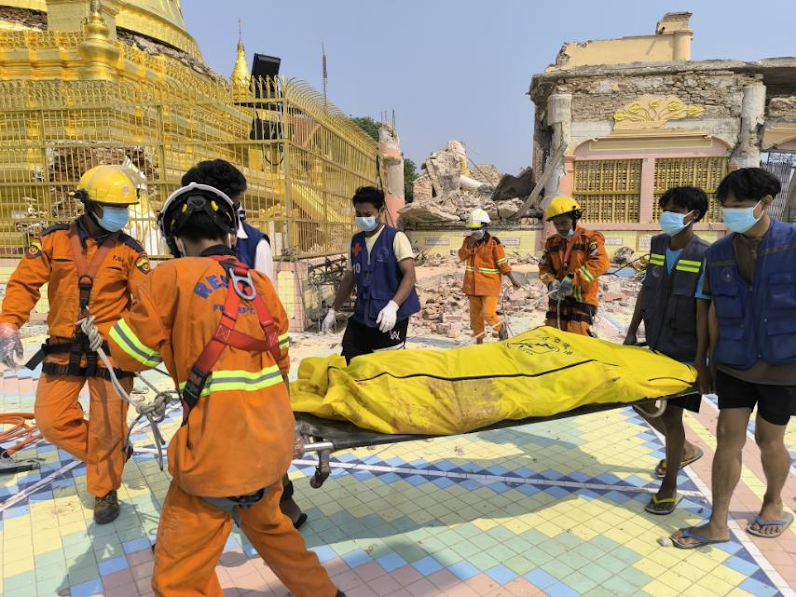Myanmar Spring Chronicle – March 29 Scene
MoeMaKa, March 30, 2025
Legitimacy of the Military Coup Government and Earthquake Rescue Efforts
In international news, Myanmar continues to make headlines following the powerful earthquake that struck on the 28th of this month. As of March 29, reports highlight that over 1,600 people have died due to the earthquake. Despite the tragedy, the military continues to carry out airstrikes in northern Shan State, which is also being reported by international outlets. The primary focus of the coverage has been on the rising death toll and the international community’s emergency aid efforts.
News reports confirm more than 1,600 fatalities, and there is a possibility that the number of dead and injured may continue to rise.
In the wake of the earthquake, several neighboring and international countries have dispatched emergency rescue teams to assist those trapped or affected. Countries like China, ASEAN member states, India, New Zealand, and the United States are reportedly in contact with relevant organizations to coordinate support for the earthquake-hit areas.
This has raised concerns among some about whether the military junta could gain legitimacy as the recognized government through these interactions. The worry is that by coordinating international aid efforts through the junta, foreign governments might be seen as legitimizing the military regime. While this concern is not unfounded, it reflects the sensitive considerations and deliberations foreign governments must navigate. However, it’s likely these countries understand that engaging with the junta for emergency humanitarian assistance does not equate to recognizing it as a legitimate government. Nations such as India, China, and Thailand had already been engaging with the junta prior to the earthquake. In contrast, Western countries are likely to maintain a clear separation between humanitarian aid and political recognition.
The most severely affected areas are under the control of the military junta, including cities like Mandalay, Sagaing, Nay Pyi Taw, Pyin Oo Lwin, Wuntho, and Kyaukse. Some territories in Sagaing Region under control of local People’s Defense Forces (PDFs) may also have been impacted. Urban areas with tall buildings, like Mandalay, experienced more intense damage due to denser infrastructure.
During the 2008 Cyclone Nargis disaster under the previous military government led by Than Shwe, the regime refused to request international aid and even rejected emergency support from some countries. At that time, following the 2007 Saffron Revolution and widespread criticism, the military regime distrusted and declined international humanitarian assistance.
Now, after four years of military rule following the 2021 coup, the junta has not been recognized by most of the international community, except for a few neighboring countries and Russia. The possibility that this earthquake might lead to broader international recognition of the junta remains slim—perhaps one in ten at best.
Under these conditions, some might advocate against providing any assistance to avoid engagement with the junta. However, such pressure could politicize humanitarian aid and potentially delay or obstruct life-saving assistance for affected civilians.
Social media discussions have emerged calling for all conflicting parties to suspend military operations temporarily and instead focus on rescue efforts to save earthquake victims. These voices are urging all sides to unite, at least temporarily, to provide medical and rescue support to those in need.
While there is hope that such a natural disaster could create a window of opportunity for peace, there is currently no clear sign that this will lead to a path toward national reconciliation. To reach a ceasefire and possibly move toward peace, rescue efforts must be carried out impartially and with justice. It is crucial that no one side is pressured or blamed while the other is let off the hook.
Following the quake, the National Unity Government (NUG) announced a two-week suspension of its offensive operations. However, the military junta carried out an airstrike on a village in Naungcho Township on the afternoon of the earthquake (March 28), signaling that it is not ready to cease hostilities, even in the wake of a national disaster.

